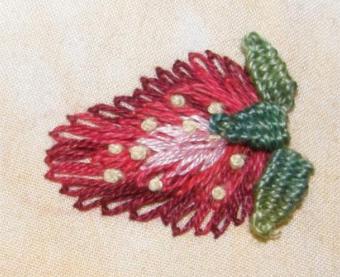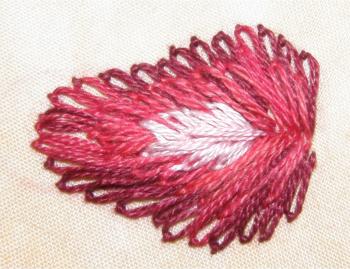- Home
- Basic embroidery stitches
- Lazy Daisy Stitch
Get Creative with Lazy Daisy Stitch: Embroidering A Sweet Strawberry

You often see lazy daisy stitch (or detached chain stitch) used to create little embroidered flowers but it is a much more versatile embroidery stitch than you might first think.
Here I used it to make a cute little strawberry embroidery design for my Strawberries and Cream crazy quilt block.
I thought you might like to see how I made it. If you haven't tried lazy daisy stitch before you might want to look at my page on chain stitch embroidery to see how to work it
If you want to jump straight to the step by step photos of the strawberry tutorial, click the link.
The significant thing about hand embroidery is that you do not have to stick rigidly to particular thread colour numbers as is necessary for counted cross stitch. Just pick colours you feel go together to stitch your strawberry.
I used an overdyed floss from Needle Necessities in dark reds for my first "layer" of lazy daisy stitches, followed by a medium red mixture that I found in a mixed bag of threads from a charity shop, for the next layer.
I finished the base with a variegated pink/white embroidery floss from DMC. Then I added some flower thread yellow French knots on top, and I used an overdyed perle in greens for the woven picot sepals.
The lovely thing about stitching strawberries, in lazy daisy stitch or any other, is that they are simple to draw!
I took a disappearing ink pen and sketched out the shape on my fabric. In fact, I realised I had made it too long at first so redrew the bottom to make it a little shorter. The first drawing lines were not a problem as the ink fades within 48 hours. If you look really closely at the photograph above you may just see the remnants of my first sketch as I took this photo as soon as I finished the berry.
You will need:
Threads of your choice - in burgundy, red and pink hues for the lazy daisy stitch, yellow for the seeds, and green for the sepals
Embroidery needle
Tightly woven embroidery fabric
An embroidery hoop to keep your fabric tight
A disappearing ink pen to draw your outline (there isn't really a need for a free pattern here, just sketch an appropriate shape).
How to stitch your lazy daisy stitch strawberry
Draw your design onto the fabric with the disappearing ink pen (or use a hard graphite pencil if you do not have the pen). I made mine about 3 inches from tip to greenery. Don't worry about getting the fruit symmetrical as they rarely are. In fact you will end up with a more believable strawberry it it is a little wonky.
The base layer of stitches

I started the stitching near the bottom end of the strawberry, as shown by the arrow in the photograph, using 2 strands of the darkest floss. My thread was hand-dyed (not by me) and therefore includes different shades throughout.
Take long lazy daisy stitches right to the outline you drew, remembering to keep the thread under the needle. Then anchor each stitch down with a tiny stitch just outside the outline. To begin with, I kept the stitches at the same angle and close together.
Then as I worked my way around the shape, I spaced them further apart and followed the curve on the outside, moving up the other side of the strawberry until I reached the top.
Building up the layers

To help create a raised effect in the centre of my strawberry, I took a few straight stitches in the empty central area in the same thread as the bottom layer of lazy daisy stitches.
Changing to a lighter coloured thread, (this one was thicker, so I only used a single strand) I began the second layer. Each one of these stitches overlapped the previous layer by about halfway.
This time I began each stitch right down the central line of the strawberry, without leaving a gap. I took some stitches across that central line to help blend them in to each other and soften the line down the middle a little.
The red lazy daisy stitch completed

The next photo in the sequence shows this step completed.
Adding a highlight

I again worked the third layer of stitches over the top, using a lighter coloured floss. This creates the highlight area where the light is catching the berry.
I then took the last stitch down the central line of the strawberry.
Seeds and sepals complete the strawberry

Then I stitched some French knots for the seeds, in yellow or black. I added sepals made from needlewoven picots and will also add a stem and perhaps tendrils to the top of my strawberry.
I do hope you will try making a strawberry from lazy daisy stitch yourselves. If you do, I would love to see your results!
The project should have helped to show that this embroidery stitch is more versatile than you might first think. If you really wanted to emphasize the raised effect you could pad the area with felt first, as I did for my stumpwork bunny tutorial.
You could also use it over a needle felted wool sphere to create a bunnies tail.
Stay connected between projects
If you’d like occasional updates from my embroidery room, including new patterns, gentle tips, and little things I think you might enjoy, you’re warmly invited to join the Stitchin’ Times newsletter.




